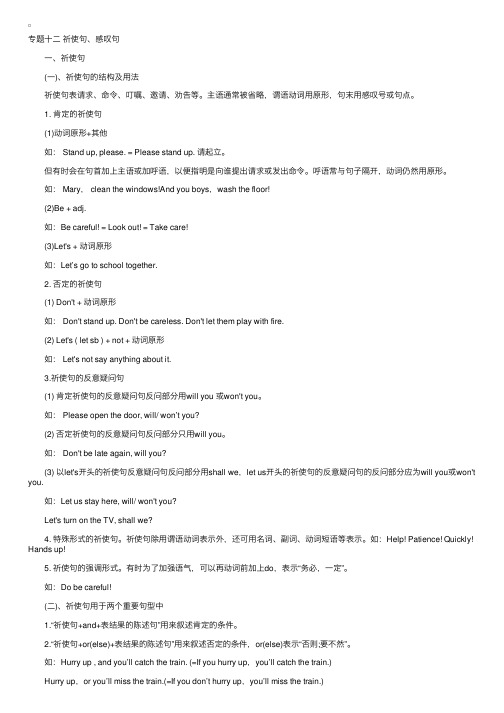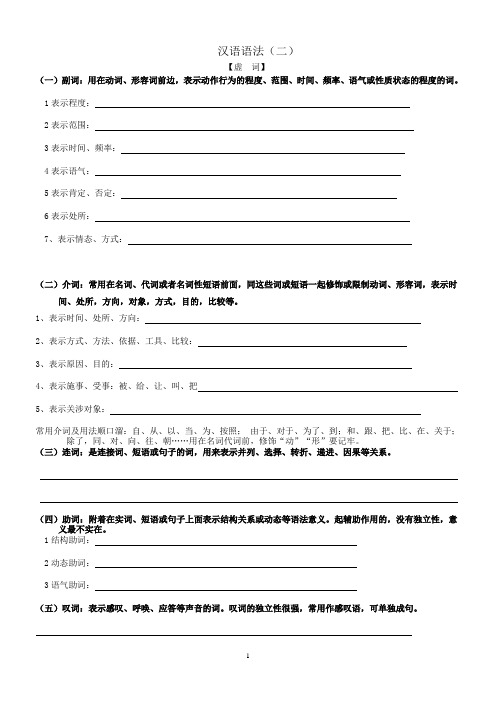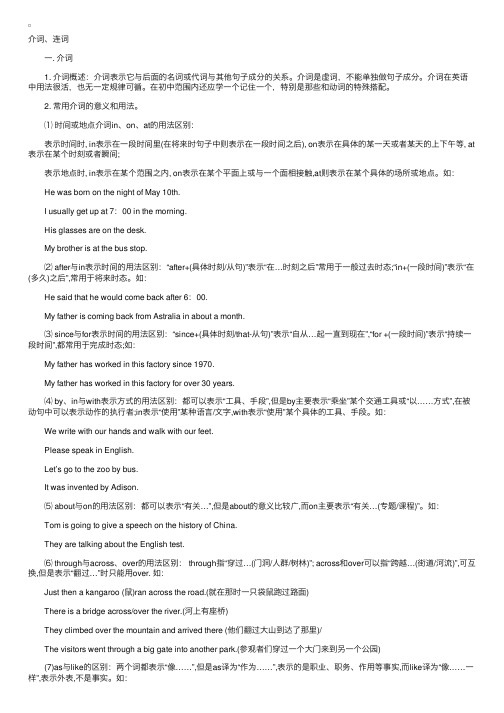2017语法
- 格式:docx
- 大小:57.57 KB
- 文档页数:62

XX秋学期七年级上册英语语法归纳人教版七年级英语语法归纳1一样此刻时:主语+d/deseleanthereverda一样此刻时:d/des2一样过去时:主语+dideleanedtherustn一样过去式:did+V原3此刻进行时:主语+a/is/aredingeareleaningthern此刻进行时:a/is/are+Ving4过去进行时:as/eredingeereheaningtherat:00esterdaafternn过去进行时:as/ere+Ving此刻完成时:have/hasdneehaveleanedtheralread此刻完成时:have/has+过去分词(pp)6过去完成时:haddneehadleanedtherbefrehearrived过去完成时:had+pp7一样以后时:illd/eillleanthertrr一样以后时:ill+Ving/is/are+gingt+V原8过去以后时:as/eret/ulddHesaidheuldleanthernext 过去以后时:uld/as/ere+V原动词不定式:t+Ving一、一样此刻时:概念:常常、反复发生的动作或行为及此刻的某种状况。
时刻状语:ften,usuall,alas,seties,everee(da,ear,nth...),neaee,nSundas,et.大体结构:①be动词;②行为动词否定形式:①a/is/are+nt;②现在态的谓语动词假设为行为动词,那么在其前加dn't,如主语为第三人称单数,那么用desn't,同时还原行为动词。
一样疑问句:①把be动词放于句首;②用助动词d提问,如主语为第三人称单数,那么用des,同时,还原行为动词。
二、一样过去时:概念:过去某个时刻里发生的动作或状态;过去适应性、常常性的动作、行为。
时刻状语:ag,esterda,thedabefreesterda,lastee(ear,night,nth...),in1989,ustn,attheagef,neda,lnglngag,neupnatie,et.大体结构:①be动词;②行为动词否定形式:①as/ere+nt;②在行为动词前加didn't,同时还原行为动词。

专题⼗⼆祈使句、感叹句 ⼀、祈使句 (⼀)、祈使句的结构及⽤法 祈使句表请求、命令、叮嘱、邀请、劝告等。
主语通常被省略,谓语动词⽤原形,句末⽤感叹号或句点。
1. 肯定的祈使句 (1)动词原形+其他 如: Stand up, please. = Please stand up. 请起⽴。
但有时会在句⾸加上主语或加呼语,以便指明是向谁提出请求或发出命令。
呼语常与句⼦隔开,动词仍然⽤原形。
如: Mary, clean the windows!And you boys,wash the floor! (2)Be + adj. 如:Be careful! = Look out! = Take care! (3)Let's + 动词原形 如:Let’s go to school together. 2. 否定的祈使句 (1) Don't + 动词原形 如: Don't stand up. Don't be careless. Don't let them play with fire. (2) Let's ( let sb ) + not + 动词原形 如: Let's not say anything about it. 3.祈使句的反意疑问句 (1) 肯定祈使句的反意疑问句反问部分⽤will you 或won't you。
如: Please open the door, will/ won’t you? (2) 否定祈使句的反意疑问句反问部分只⽤will you。
如: Don't be late again, will you? (3) 以let's开头的祈使句反意疑问句反问部分⽤shall we,let us开头的祈使句的反意疑问句的反问部分应为will you或won't you. 如:Let us stay here, will/ won't you? Let's turn on the TV, shall we? 4. 特殊形式的祈使句。

汉语语法(二)【虚词】(一)副词:用在动词、形容词前边,表示动作行为的程度、范围、时间、频率、语气或性质状态的程度的词。
1表示程度:2表示范围:3表示时间、频率:4表示语气:5表示肯定、否定:6表示处所:7、表示情态、方式:(二)介词:常用在名词、代词或者名词性短语前面,同这些词或短语一起修饰或限制动词、形容词,表示时间、处所,方向,对象,方式,目的,比较等。
1、表示时间、处所、方向:2、表示方式、方法、依据、工具、比较:3、表示原因、目的:4、表示施事、受事:被、给、让、叫、把5、表示关涉对象:常用介词及用法顺口溜:自、从、以、当、为、按照;由于、对于、为了、到;和、跟、把、比、在、关于;除了,同、对、向、往、朝……用在名词代词前,修饰“动”“形”要记牢。
(三)连词:是连接词、短语或句子的词,用来表示并列、选择、转折、递进、因果等关系。
(四)助词:附着在实词、短语或句子上面表示结构关系或动态等语法意义。
起辅助作用的,没有独立性,意义最不实在。
1结构助词:2动态助词:3语气助词:(五)叹词:表示感叹、呼唤、应答等声音的词。
叹词的独立性很强,常用作感叹语,可单独成句。
(六)拟声词:模拟人或事物声音的词,又叫“象声词”。
【巩固练习】一、标明下列各组词的词性。
坚决()--决心()可爱()--热爱()荣誉()--光荣()企图()--意图()答案()--答应()气愤()--气魄()批语()--批示()残杀()--残忍()诱饵()--诱惑()兴奋()--兴趣()安心()--担心()道歉()--抱歉()安慰()--欣慰()感激()--激动()愉快()--高兴()二、注明下列句中带黑线词的词性:1、我们( )马上( ) 做( )这项( )工作。
( )2、你( )说( )应该( ) 考虑 ( ) 什么( )?3、对( )这个学生( )的经历( ),老师们都( )很了解。
( )4、三十岁( )以上的教师( )都可以( )享受( )休假。

2017届高三语法复习(一)简单句的五种基本句型一)、主系表结构(SVP)=主语+连系动词+表语1.Mr. Brown is an engineer.2.He is handsome.3.This bike is not his.4.My mother is in good health.5.The machine is out of order. / His father is out of work.6.The television was on. / Time is up. / School is over. / .I’ll be off. / My father is in.7.My advice is to tell the truth. 8.Seeing is believing.9.The old man seems deaf. 10.He appeared tired.11.The food looks inviting . 12.The cake tastes delicious13.This idea sounds great. 14.These flowers smell sweet.15.She felt a little cold. 16.The dress feels very soft.17. Our city is becoming more and more beautiful. He has become a writer.18. The leaves have turned green. He has turned writer.19.It’s getting warmer and warmer. 20.His dream has come true.21.The potatoes went bad in the fields. 22.The river ran dry.23.When the children grow up,the parents grow old. 24.That baby fell asleep.25.Children seldom keep quiet . 26.The language stayed the same.27.He remained silent / a worker./ in the classroom ./ seated there / sitting there.28. He proved ( to be) a very strict teacher. 29. The whole area has lain waste for many years. 30. get ready/ married/ lost/ killed/ burnt go bad/mad/ wrong / hungry fall ill/asleep/silentkeep quiet / fit / healthy lie idle stand still二)、主谓结构(S V)=主语+不及物动词1 Time flies. 2. The sun rises in the east. 3.The sun sets in the west.4. I can swim .5. Classes begin at eight every day.6.I lived in Beijing five years ago.7. Great changes have taken place in my home town in the past ten years.8. My grandfather gets up early in the morning.9.In autumn, some birds fly to the south. 10. The pen writes smoothly三)、主谓宾结构(SVO)=主语+及物动词+宾语1. I wrote a letter last night.2. Who knows the answer?3. He enjoys reading.4. I want to have a cup of tea.5. That gentleman can speak three languages fluently.6.She is doing her homework carefully.7. Jim cannot dress himself.8. I received a letter from my penfriend in Australia.9. He has read this book many times. 10. They have carried out the plan successfully. 四)、主谓双宾结构(SVOiOd)=主语+及物动词+间接宾语+直接宾语1.Mr Johnson taught us German last year.2.Grandma told me an interesting story last night.3.Would you please pass me the dictionary?4.He showed the ticket to the conductor.5. Please hand him a book .6..I lent her my bike.7.Careless driving cost him his life.8.The boy sent me the message. 9. Who will fetch me some chalk?10. He bought a new coat for his mother with his first month’s salary.五)、主谓宾宾补结构(SVOCo)=主语+及物动词+宾语+宾语补足语1. All of us considered him honest.2. He asked me to come back soon.3. This set them thinking.4.I want you to tell me the truth.5.The guards ordered us to leave at once.6.Every morning we hear him read English aloud.7She is listening to someone telling stories. 8.We won’t let her go out at night.9.He has his hair cut once a month. 10.The terrible sound made the children frightened.附:There be句型一 1.There is a tall tree in front of the classroom.There are two girls and a boy in the hall.There is only a table, four chairs and a small bed in the room.2.There was a meeting in our school yesterday.Is there going to be any activity tonight?There can't be any mistakes in his passage.3.There used to be a book store on the corner.There is likely to be something wrong with his computer.There seems to be something the matter with her.4.Once upon a time there lived an old monk in the temple.There stands a History Museum near the station.二There are still many things for us to do.我们还有很多的事情要做。

介词、连词 ⼀. 介词 1. 介词概述:介词表⽰它与后⾯的名词或代词与其他句⼦成分的关系。
介词是虚词,不能单独做句⼦成分。
介词在英语中⽤法很活,也⽆⼀定规律可循。
在初中范围内还应学⼀个记住⼀个,特别是那些和动词的特殊搭配。
2. 常⽤介词的意义和⽤法。
⑴时间或地点介词in、on、at的⽤法区别: 表⽰时间时, in表⽰在⼀段时间⾥(在将来时句⼦中则表⽰在⼀段时间之后), on表⽰在具体的某⼀天或者某天的上下午等, at 表⽰在某个时刻或者瞬间; 表⽰地点时, in表⽰在某个范围之内, on表⽰在某个平⾯上或与⼀个⾯相接触,at则表⽰在某个具体的场所或地点。
如: He was born on the night of May 10th. I usually get up at 7:00 in the morning. His glasses are on the desk. My brother is at the bus stop. ⑵ after与in表⽰时间的⽤法区别:“after+(具体时刻/从句)”表⽰“在…时刻之后”常⽤于⼀般过去时态;“in+(⼀段时间)”表⽰“在(多久)之后”,常⽤于将来时态。
如: He said that he would come back after 6:00. My father is coming back from Astralia in about a month. ⑶ since与for表⽰时间的⽤法区别:“since+(具体时刻/that-从句)”表⽰“⾃从…起⼀直到现在”,“for +(⼀段时间)”表⽰“持续⼀段时间”,都常⽤于完成时态;如: My father has worked in this factory since 1970. My father has worked in this factory for over 30 years. ⑷ by、in与with表⽰⽅式的⽤法区别:都可以表⽰“⼯具、⼿段”,但是by主要表⽰“乘坐”某个交通⼯具或“以……⽅式”,在被动句中可以表⽰动作的执⾏者;in表⽰“使⽤”某种语⾔/⽂字,with表⽰“使⽤”某个具体的⼯具、⼿段。

最新2017中考英语语法总复习讲义基础铺垫1.词性概述2.句子成分WARM-UP:1)The teacher in the classroom.2)Sang many songs and danced happily.3)She attracts.4)Many people living in the country.5)All the books on the desk over there.以上这些形式都不能构成英语句子。
英语句子(sentence)=主语+谓语(核心:主动词)I.八大成分的概念和构成1.主语(名词代词形):句子的主体,是谓语陈述,说明的对象。
If you want the rainbow you have to put up with the rain.不经历风雨,怎么见彩虹。
The secret of success is to start from scratch and keep on scratching.成功的秘诀在于从磨练开始,并要坚持不断磨练。
充当主语的形式:1)名词2)代词3)名词短语4)名词从句5)数词6)不定式7)-ing形式8)介词短语(少见)形式主语(名词从句,不定式,动名词)(见第六讲主语和宾语)2.谓语:表示主语的行为或进行的活动。
I have a dream.You don’t always want what you need, or need what you want.所需之物未必皆所欲,所欲未必皆所需。
谓语形式:动词(英语句子的灵魂)3.宾语:行为或活动的对象,接受者或受影响者。
You don’t find opportunities…you make them.你找不到机会。
你得去创造机会。
You probably won’t hear opportunity knock if your television is always on.如果你常开着电视,你就可能听不到机会的敲门声。
2017高考英语语法代词的分类一、人称代词1.人称代词不仅仅指人,也可以指事或物。
2.第三人称的人称代词分阳性 he(him),阴性 she(her)和中性 it(it),复数和宾语形式都只有一个形式 they 和 them,不分性别。
3.选用什么人称代词,取决于所要代替的名词。
在数和性上要与所代替的名啊啊词保持一致。
二、物主代词物主代词是用来表示所有关系的,分为形容词性物主代词和名词性物主代词两种。
形容词性物主代词放在名词前作定语,相当于形容词;名词性物主代词相当于“形容词性物主代词+名词” ,相当于名词,可以作主语、表语或宾语。
物主代词的用法:(1)形容词性物主代词放在名词前作定语。
例如: His pencil box is on the desk. This is our school.(2)名词性物主代词作名词用,本身就相当于“形容词性物主代词+名词” ,因此,后面不可再加名词。
作主语:Richard’s school bag is blue and mine is black. 理查德的书包是蓝色的,我的书包是黑色的。
(mine=my school bag)作表语:It’s his. 这是他的(东西)。
作宾语: He borrows your dictionary and you may borrow mine. 他借你的字典,你可以借我的。
(作及物动词的宾语) “of+名词性物主代词”可以放在名词后作定语,表示强调: He is a friend of mine. 他是我的一个朋友·注意:试比较下面两句句子:This is a photo of mine. 这是我的一张照片。
(照片是我拥有的,但不一定照的是我本人)This is a photo of me. 这是一张我本人的照片。
(照片上是我本人)三、反身代词反身代词用于所强调的动作与动作执行者的关系。
通常在句中作表语、宾语和同位语。
全真题演练第一部分简单句第一章简单句的核心第一节简单句的核心构成1. 主谓=主语+不及物动词(vi。
)Smaller species survived. (2006, Reading Comprehension, Part A Text 3)More apparent reasonableness followed. (2014,Reading Comprehension, PartA Text 1)2. 主谓宾=主语+及物动词(vt.) +宾语Everybody loves a fat pay rise. (2005, Reading Comprehension, PartA, Text1)Many students experience both varieties。
(2011, Reading Comprehension, PartB)…very few women have 15 children. (2000, Reading Comprehension, Part A Text 2)Several of his staff members have military—intelligence backgrounds. (2003, Reading Comprehension, Part A Text 1)3. 主谓双宾=主语+及物动词(vt.)+两个宾语(人+物)They gave justices permanent positions.。
.(2012, Use of English)… railroadscharged all customers the same average rate..。
(2003, ReadingComprehension, Part A Text 3)4. 主谓宾补=主语+及物动词(vt。
)+宾语+宾语的补足语(简称宾补)You always keep your eyes open..。
人教版新目标初中英语语法大全初中英语语法学习提纲一、词类、句子成分和构词法:1、词类:英语词类分十种:名词、形容词、代词、数词、冠词、动词、副词、介词、连词、感叹词。
1、名词(n.):表示人、事物、地点或抽象概念的名称。
如:boy, morning, bag, ball, class,orange.2、代词(pron.):主要用来代替名词。
如:who, she, you, it .3、形容词(adj..):表示人或事物的性质或特征。
如:good, right, white, orange .4、数词(num.):表示数目或事物的顺序。
如:one, two, three, first, second, third, fourth.5、动词(v.):表示动作或状态。
如:am, is,are,have,see .6、副词(adv.):修饰动词、形容词或其他副词,说明时间、地点、程度等。
如:now, very, here, often, quietly,slowly.7、冠词(art..):用在名词前,帮助说明名词。
如:a, an, the.8、介词(prep.):表示它后面的名词或代词与其他句子成分的关系。
如in, on, from, above,behind.9、连词(conj.):用来连接词、短语或句子。
如and, but, before .10、感叹词(interj..)表示喜、怒、哀、乐等感情。
如:oh, well, hi, hello.2、句子成分:英语句子成分分为七种:主语、谓语、宾语、定语、状语、表语、宾语补足语。
1、主语是句子所要说的人或事物,回答是“谁”或者“什么”。
通常用名词或代词担任。
如:I’mMiss Green.(我是格林小姐)2、谓语动词说明主语的动作或状态,回答“做(什么)”。
主要由动词担任。
如:Jack cleans the roomevery day. (杰克每天打扫房间)3、表语在系动词之后,说明主语的身份或特征,回答是“什么”或者“怎么样”。
217英语语法专练九年级第一学期( )( )1.There are some in the fridge.A:fruit B:dishes C:bread D:ice-cream( )2. chicken did you have for lunch?A:How B:What C:How many D:How much ( )3. I think you’d better not eat sweets.A:too many B:too much C:so many D:so much ( )4. Amazon is shorter than Nile.A:An…a B:The…/ C:/…/ D:The…the( )5.The Browns a football match when theguests knocked on the door.A:was watching B:is watching C:were watching D:are watching ( )6.China is famous for .A:great wall B:the great wall C:Great Wall D:the Great Wall ( )7.The government needs money to make the rivers clean. A:a lot B:a great manyC:a large amount of D:a large number of( )8.Washington is the capital of .A:America B:an America C:the America D: Americans ( )9.We should take .A:a good advice B:an advice goodC:some good advice D: some good advices( ) news often gives us lots of .A:informations B: informationC:piece of information D: pieces of informations( )1.In his letter,Uncle Lee told us many about his visitto the United States.A:news B:stories C:information D:truth( )2.I spent large numbers of preparing for the final exams.A:energy B:time C:hours D:strength( )3.Many tourists from different come to visit Shanghai every year. A:country B: countrys C: countries D: country’s( )4.Miss Smith doesn’t have housework to do today .A:much B:many C:a lot D:a piece( )5.We finally got several of his innocence.A:proof B:proofs C:proves D:prooves( )6.A group of boy students basketball on the playground at the moment .A:play B:plays C:is playing D:are playing( )7.My aunt bought cotton stockings for me at the department store.A:a pair of B:a loaf of C:a piece of D:a group of ( )8.Wang Daming has caught some ,and his family willhave for supper today .A:fish…fishes B:fishes…fish C:fishes…fishes D:fishing…fish( )9.There are many in this hospital .A:woman doctor B: woman doctors C: women doctor D: women doctors ( )st week I ate .A:too much hamburger B: too many hamburger( )1.There was mud on the ground after the heavy rain.A:any B:many C:much D:lot of( )2.I need scissors to cut the paper.A:a B:a pair of C:a piece of D:two( )3.Don’t eat chocolate .It’s bad to your teeth .A:too much B:so much C:too many D:so many( )4.We need huge amounts of about computers .A:books B:notes C:newspapers D:information( )5.We have in our new flat .A:much furniture B: msny furnituresC: plenty furniture D: a lot of furnitures( )6.You may find rubbish at a building site .A:many B:a lot of C:plenty D:amount of( )7.Mr and Mrs Green are a happy .A:pair B:group C:couple D:people( )8.Electrical appliances are powered by .A:electric B: electricity C: electricitys D: electricities( )9.Would the students like to have a discussion on in class .A:pollution B: pollutions C:a pollution D: some pollutions ( )10.What we are having today!A:such a nice weather B:a nice weatherC:so nice a weather D:nice weather1.不可数名词没有单、复数区别,一般以单数对待,物质名词喝抽象名词多数为不可数名词 2.不可数名词如果要计算的话,要使用“单位词”( )1.Li Dong is a friend of my .We often play card games together。
A:brother B: brothers C: brothers’s D: brother’s( )2.The children enjoyed themselves at the Palace .A:Childs’B: Children C: Children’s D: Childrens’( )3.It’s twenty walk from my home to school .A:minute B:minutes C:minute’s D:minutes’( )4.Is there any news in newspaper?A:today B:today’s C:todays’D:today of( )5. Explosive was used for making roads.A:Nobel’s B:Nobels’C:Nobel D:The Nobel’s( )6.Tom’s and Peter’s are good friends.A:father B:Father C: fathers D: Fathers( )7.My scarf is softer than .A:Kitty B: Kitty’s C: Kittys D: Kittys’( )8.Susan and Betty live in the same flat .It is .A: Susan and Betty B: Susan’s and BettyC: Susan and Betty’s D: Susan’s and Betty’s( )9.Three-fourths of surface is covered with water.A:the earth’s B: the earth C: earth’s D: the earth s’( )10.What have you finished ?I have finished .A:a day work B:a day’s workC:day’s working D:a-day-work( )1.To say something one thing ,to do it another. A:is…are B:are…is C:is…is D:are…are( )2.She and I classmates when we were at college . A:am B:was C:are D:were( )3.Both Tom and Mary the exam .A:has passed B:have been passedC:have passed D:had passed( )4.Not the students but the teacher there just now. A:was seen B:were seen C:have seen D:has seen ( )5.The singer and dancer our party this evening .A:is to attend B:are going to attendC:shall be attend D:were to attend( )6.Many a boy and many a girl there.A:have been B:have gone C:has been D:has been to ( )7.Nobody but Smith and John in the laboratory yesterday . A:are B:had been C:were D:was( )8.Mary,along with her parents , to Paris .A:have moved B:has moved C:are moving D:have been moving ( )9.The factory ,including its machines , burnt last night . A:were B:had been C:was D:has been( )10.Either of the books mine .A:belong to B:is of C:is D:are( )11.This pair of trousers too long for me.Please show me another.( )12.A number of their products put on exhibition .A:has been B:is C:have been D:are( )13.His parents as well as he very kind to me .A:is B:are C:do D:does( )14.What they needed experienced English teachers. A:is B:are C:was D:were( )15.Every door and every window to be cleaned. A:is B:are C: do D:does( ) as well as other continents veryrich natural resources.A:has B:have C:are D:is( )17.What they have done useful to the people.A:are considered B: is consideredC: have been considered D:will be considered( )18.Those who have applied for the post in the office. A:are being interviewed B: will interviewedC: are interviewed D: to be interviewed( )19.The audience ,as well as the chairman ,deeply moved by the speech given by the teacher.A:was B:were C:are D:is( )20.Writing stories and poems what I enjoy most。